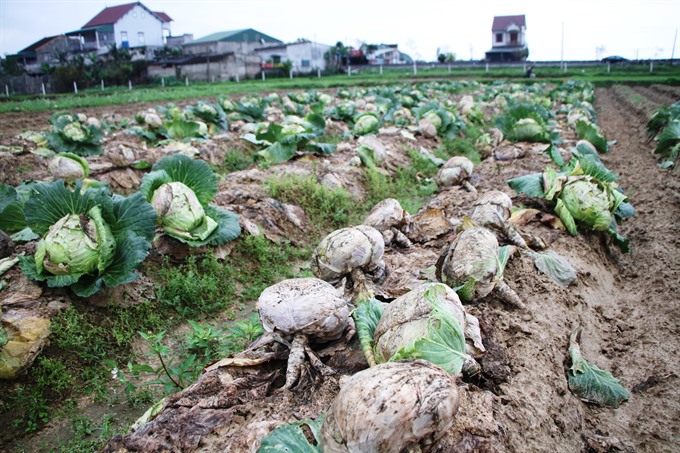 Society
Society

After waking up at 5am, Nguyễn Thị Oanh, a farmer in Hà Nội’s Ba Vì District, headed to the field to cut cabbages and carried them to the local market for sale. Some 40 cabbages freshly cut on the farm filled her two baskets. But Oanh’s mood was gloomy.
 |
| Cabbages are left rotten on the field in Hà Tĩnh Province. Due to low prices, no traders have come to buy the vegetables. – VNA/VNS Photo Phan Quân |
HÀ NỘI — After waking up at 5am, Nguyễn Thị Oanh, a farmer in Hà Nội’s Ba Vì District, headed to the field to cut cabbages and carried them to the local market for sale.
Some 40 cabbages freshly harvested on the farm filled her two baskets. But Oanh’s mood was gloomy.
“Even if they are sold out, I will earn less than VNĐ100,000 (US$4.3),” Oanh estimated.
This year, she grew nearly 1,500 sq.m of cabbages, yielding some two tonnes of cabbages. Oanh estimated that if the cabbages are sold to traders, after she accounts for her spending on the seeds and the caring process, she will lose more than VNĐ4 million ($174) in total.
Vegetable and fruit prices in the north are reported to be cheaper than ever before, local media reported after Tết (Lunar New Year) holiday.
Prices for vegetables and fruits sold at big markets in the capital city such as Dịch Vọng, Nhổn, Mai Dịch, Phùng Khoang, Hôm and Đại Từ have dropped by half or even three times as compared to those before Tết.
Cabbages are sold at VNĐ6,000-8,000 per kilo, or even VNĐ1,5000 per kilo at some markets. Potatoes and cauliflowers are VNĐ8,000-10,000 per kilo. Tomatoes are VNĐ8,000-10,000 per kilo. Six German turnips are sold at only VNĐ10,000 ($0.4).
Traders of these markets said that the consumption has not surged after Tết while vegetable supply is plentiful, leading to lower prices.
Nguyễn Thị Mai, a farmer in Song Phương Commune, Hoài Đức District, Hà Nội said that never before have vegetables been as tough to sell as right now. Many families have to throw them away or bring them back home for feeding cattle.
Farmers in the
In Nghệ An Province, the vegetable fields of Quỳnh Lưu, Yên Thành and Hưng Nguyễn districts have been abandoned since Tết. Farmers even pulled up cabbages to feed to their pigs.
Nguyễn Thị Minh, a farmer in Quỳnh Lương Commune, Quỳnh Lưu district told online newspaper Dân Trí, “This year farmers and traders do not bother buying vegetables as the prices are too low. Farmers suffered losses in spite of efforts and expenses.”
In Hà Tĩnh, farmers are harvesting their vegetables to feed pigs and cattle. Others have let the plants wither in the fields.
Nguyễn Đình Dũng, a farmer in the province’s Thạch Liên Commune, said he had fed his vegetables to his cows as no traders came to his field after Tết.
Nguyễn Sỹ Dần, chairman of Thạch Liên Commune, said favourable weather at the end of last year resulted in a bumper crop of mustard, cabbage, turnip and lettuce. But as always, a bumper crop meant a price fall as supply exceeded consumption, he said.
Farmers in Thừa Thiên- Huế experienced a similar situation. Vegetables produced by farmers in the province could not be consumed either due to a similar price fall.
Local farmers said the cost for each kg fell from VNĐ25,000 (US$1.1) to VNĐ2,000, driving traders away from their VietGAP (Vietnamese Good Agriculture Practice) produce.
Trương Hào, a farmer in Quảng Thành Commune, said he had to harvest the mature lettuce to feed pigs and attempt to save the younger plants until a price increase would allow him to sell them more profitably.
Meanwhile, in Đà Lạt City and Đơn Dương District of Central Highlands
Farmers of wards No.7 and 8 in Đà
Trần Xuân Định, deputy head of the Department of Crop Production under the Ministry of Agriculture and Rural Development told online newspaper Dân Việt that after Tết, farmers harvested vegetables of the winter season to start a new season. The supply has surged dramatically, exceeding demand.
It is also because the favourable weather conditions of the winter-spring season increased productivity, he said.
Regarding speculation that prices for domestically grown vegetables have declined because of vegetables imported from
Hoàng Trung, head of the ministry’s Plant Protection Department, also confirmed to Dân Việt that imported vegetables have not affected domestic vegetable prices. - VNS




